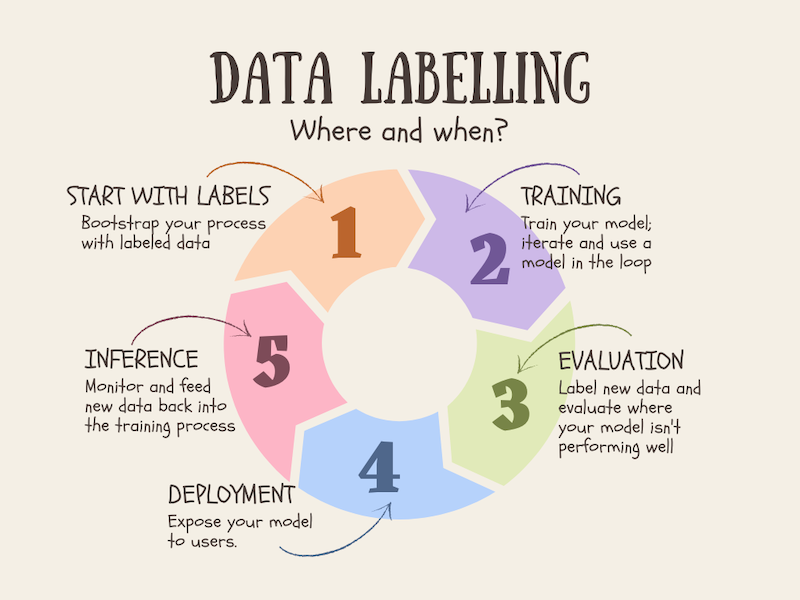Freelance Data Annotator
In the fast-paced world of artificial intelligence and machine learning, the demand for annotated data is soaring, driving the growth of freelance data annotation as a viable career option. Data annotators play a pivotal role in labeling and structuring datasets, enabling machines to learn and make informed decisions. Whether you’re a seasoned professional or just starting out in the field, mastering the art of data annotation can open doors to lucrative opportunities and rewarding projects. Here are seven tips to help you thrive as a freelance data annotator:
1. Develop a Strong Foundation: Before diving into the world of data annotation, it’s essential to build a solid understanding of the underlying concepts and methodologies. Familiarize yourself with common annotation tasks such as image labeling, text tagging, and audio transcription, as well as the tools and software used in the annotation process. Online courses, tutorials, and resources from platforms like Coursera, Udacity, and YouTube can serve as invaluable learning resources to sharpen your skills and expand your knowledge base.
2. Hone Your Annotation Skills: Data annotation requires precision, attention to detail, and consistency to produce high-quality labeled datasets. Practice annotating sample datasets and hone your skills in accurately labeling different types of data, whether it’s images, text, audio, or video. Pay close attention to annotation guidelines, specifications, and quality standards provided by clients or project managers, and strive to deliver annotations that meet or exceed their expectations. Consistent practice and feedback from peers or mentors can help you refine your annotation skills and improve your efficiency over time.
3. Stay Updated on Industry Trends: The field of data annotation is dynamic, with new techniques, tools, and trends emerging constantly. Stay abreast of industry developments, advancements in annotation technologies, and best practices through blogs, forums, webinars, and conferences. Engage with the data annotation community on platforms like LinkedIn, Reddit, and specialized forums to exchange insights, learn from peers, and stay informed about the latest trends shaping the industry. By staying proactive and adaptable, you can position yourself as a knowledgeable and sought-after data annotator in the freelance marketplace.
4. Cultivate Attention to Detail: Attention to detail is paramount in data annotation, as even minor errors or inconsistencies can compromise the quality and reliability of labeled datasets. Pay meticulous attention to annotation guidelines, ensure accuracy and consistency across annotations, and double-check your work for any errors or omissions before submission. Develop strategies to mitigate common pitfalls such as label ambiguity, occlusion, and noise, and adopt a systematic approach to reviewing and validating annotations to maintain high-quality standards. Cultivating a keen eye for detail will not only enhance your annotation proficiency but also earn you a reputation for delivering accurate and reliable results.
5. Embrace Collaboration and Feedback: Collaboration and feedback are essential components of professional growth and development as a freelance data annotator. Engage with clients, project managers, and fellow annotators to solicit feedback, clarify requirements, and address any concerns or challenges that may arise during the annotation process. Actively participate in team meetings, brainstorming sessions, and peer reviews to exchange ideas, share best practices, and learn from others’ experiences. Embrace constructive criticism as an opportunity for learning and improvement, and strive to incorporate feedback into your workflow to enhance your skills and performance over time.
6. Prioritize Time Management and Organization: Effective time management and organization are crucial for maximizing productivity and meeting project deadlines as a freelance data annotator. Develop a systematic workflow and prioritize tasks based on their urgency and importance, allocating sufficient time for annotation, review, and quality assurance activities. Leverage project management tools, task trackers, and calendar apps to schedule and track your daily activities, set realistic goals and milestones, and monitor your progress towards achieving them. Break down larger projects into smaller, manageable tasks, and establish a routine that balances productivity with self-care to avoid burnout and maintain long-term success.

7. Build Your TagsProfessional Brand: As a freelance data annotator, building a strong professional brand is key to attracting clients, securing projects, and establishing yourself as a trusted expert in the field. Create a compelling portfolio showcasing your expertise, experience, and past projects, and highlight your unique skills and capabilities as a data annotator. Leverage social media platforms, professional networks, and freelance marketplaces to promote your services, connect with potential clients, and showcase your portfolio to a wider audience. Cultivate relationships with clients, deliver exceptional results consistently, and ask satisfied clients for testimonials or referrals to build credibility and trust in your brand.
In conclusion, success as a freelance data annotator requires a combination of technical expertise, attention to detail, continuous learning, and effective communication skills. By following these seven tips and adopting a proactive and collaborative approach to your work, you can excel in the field of data annotation, unlock new opportunities, and carve out a fulfilling career path in the ever-evolving landscape of artificial intelligence and machine learning.
Expanding Horizons: Elevating Your Career as a Freelance Data Annotator
In the realm of freelance data annotation, there exists a myriad of avenues for professional growth and success. Let’s delve deeper into additional strategies and considerations to further elevate your career as a freelance data annotator:
8. Specialize in Niche Domains: While proficiency in general data annotation tasks is essential, consider specializing in niche domains or verticals to differentiate yourself and attract specialized projects. Whether it’s medical imaging, geospatial data annotation, or financial data labeling, becoming an expert in a specific domain can open doors to high-value projects and lucrative opportunities. Invest time in acquiring domain-specific knowledge, understanding unique annotation requirements, and honing your skills to become a go-to expert in your chosen niche.
9. Leverage Automation and Tooling: As the field of data annotation evolves, automation and tooling are becoming increasingly prevalent, offering opportunities to streamline workflows and enhance productivity. Familiarize yourself with annotation tools and software platforms such as Labelbox, Supervisely, and Amazon SageMaker Ground Truth, which offer features for automating repetitive tasks, managing annotation projects, and ensuring quality control. Embrace emerging technologies such as computer vision models for semi-automated annotation and data augmentation techniques for generating synthetic data, enabling you to work more efficiently and deliver higher-quality annotations at scale.
10. Establish Long-Term Client Relationships: Cultivating long-term relationships with clients is key to sustaining a successful freelance career in data annotation. Focus on delivering exceptional results, exceeding client expectations, and demonstrating your commitment to their success. Proactively communicate with clients, provide regular updates on project progress, and seek opportunities to add value beyond the scope of your initial engagement. By fostering trust, reliability, and professionalism, you can earn repeat business, referrals, and endorsements from satisfied clients, ensuring a steady stream of projects and a stable income over time.
11. Diversify Your Skill Set: In addition to mastering core data annotation tasks, consider diversifying your skill set to broaden your career opportunities and tackle more complex projects. Learn complementary skills such as data preprocessing, feature engineering, and model evaluation, which are essential for end-to-end machine learning pipeline development. Explore related roles such as data curation, data analysis, and machine learning engineering, which leverage your annotation expertise while offering opportunities for career advancement and higher earnings. By continuously expanding your skill set and adapting to evolving industry trends, you can future-proof your career and remain competitive in the dynamic field of artificial intelligence.
12. Invest in Continuous Learning: The field of data annotation is constantly evolving, with new techniques, tools, and methodologies emerging regularly. Invest in continuous learning and professional development to stay ahead of the curve and remain relevant in the competitive freelance marketplace. Enroll in advanced courses, workshops, and certifications to deepen your knowledge of annotation techniques, machine learning algorithms, and domain-specific applications. Participate in online communities, forums, and hackathons to collaborate with peers, share insights, and solve real-world annotation challenges. By embracing a growth mindset and committing to lifelong learning, you can stay at the forefront of the industry and position yourself for long-term success as a freelance data annotator.

13. Seek Mentorship and Guidance: Mentorship can be invaluable for aspiring freelance data annotators looking to navigate the complexities of the field and accelerate their professional growth. Seek out experienced mentors or industry veterans who can provide guidance, advice, and support as you embark on your freelance journey. Join mentorship programs, networking groups, and mentor-mentee platforms to connect with seasoned professionals willing to share their expertise and insights. Actively seek feedback from mentors, leverage their experience to overcome challenges, and learn from their successes and failures to chart a path towards success in your own career as a freelance data annotator.
14. Foster a Growth Mindset: Embrace a growth mindset characterized by resilience, adaptability, and a willingness to embrace challenges and learn from setbacks. View obstacles as opportunities for growth, approach new tasks with curiosity and enthusiasm, and be open to feedback and constructive criticism. Cultivate a passion for continuous improvement, set ambitious goals for your career, and celebrate your achievements along the way. By fostering a growth mindset, you can cultivate the resilience and determination needed to overcome obstacles, seize opportunities, and achieve success as a freelance data annotator in the dynamic and rapidly evolving field of artificial intelligence.
In conclusion, the path to success as a freelance data annotator is paved with continuous learning, strategic networking, and a relentless commitment to excellence. By embracing specialization, automation, and diversification, while fostering long-term client relationships and investing in continuous learning and mentorship, you can elevate your career, unlock new opportunities, and thrive in the ever-evolving landscape of artificial intelligence and machine learning. With dedication, perseverance, and a growth mindset, the possibilities for professional growth and success as a freelance data annotator are limitless.

